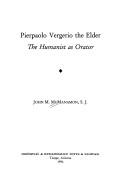| Listing 1 - 10 of 10 |
Sort by
|

ISBN: 0866982043 Year: 1996 Publisher: Tempe, Ariz. Arizona Board of Regents
Abstract | Keywords | Export | Availability | Bookmark
 Loading...
Loading...Choose an application
- Reference Manager
- EndNote
- RefWorks (Direct export to RefWorks)
Vergerio, Pier Paolo --- ITALIE --- RENAISSANCE --- VERGERIO (PIER PAOLO) --- VIE INTELLECTUELLE --- MOYEN AGE
Book
ISBN: 080781783X Year: 1989 Publisher: Chapel Hill, N.C. University of North Carolina Press
Abstract | Keywords | Export | Availability | Bookmark
 Loading...
Loading...Choose an application
- Reference Manager
- EndNote
- RefWorks (Direct export to RefWorks)
Didactic literature, Latin (Medieval and modern) --- Ethics in literature --- Funeral orations --- Humanists --- Oratory --- Rhetoric, Medieval --- Rhetoric --- Speeches, addresses, etc., Latin (Medieval and modern) --- Latin orations, Medieval and modern --- Latin speeches, Medieval and modern --- Argumentation --- Oratory, Primitive --- Speaking --- Language and languages --- Speeches, addresses, etc. --- Debates and debating --- Elocution --- Eloquence --- Lectures and lecturing --- Persuasion (Rhetoric) --- Public speaking --- Occasional speeches --- History and criticism --- History --- Italy --- Intellectual life --- Philosophy and psychology of culture --- Literary rhetorics --- Italian literature --- anno 1400-1499
Book
ISBN: 1623494397 9781623494391 9781623494384 Year: 2016 Publisher: College Station
Abstract | Keywords | Export | Availability | Bookmark
 Loading...
Loading...Choose an application
- Reference Manager
- EndNote
- RefWorks (Direct export to RefWorks)
Underwater archaeology --- Deep diving --- Excavations (Archaeology) --- Ships, Ancient --- Archaeology, Submarine --- Marine archaeology --- Maritime archaeology --- Nautical archaeology --- Submarine archaeology --- Archaeology --- Underwater exploration --- Marine archaeologists --- Ocean engineering --- Deep-sea diving --- Diving, Deep --- Diving, Submarine --- Submarine diving --- Underwater diving --- Aquatic sports --- Recreational dive industry --- Ancient ships --- History. --- Equipment and supplies. --- Nemi, Lake (Italy) --- Lago di Nemi (Italy) --- Lago nemorense (Italy) --- Lake Nemi (Italy) --- Nemorensis Lacus (Italy) --- Antiquities. --- Humanism --- Renaissance --- Navires anciens --- Plongée sous-marine --- Archéologie sous-marine --- Humanisme --- Histoire --- Nemi, Lac de (Italie) --- Antiquities, Roman --- Antiquités romaines
Book
ISBN: 9781648431142 1648431143 Year: 2023 Publisher: College Station : Texas A&M University Press,
Abstract | Keywords | Export | Availability | Bookmark
 Loading...
Loading...Choose an application
- Reference Manager
- EndNote
- RefWorks (Direct export to RefWorks)
"The saga of Caligula's sunken barges in Lake Nemi in Italy -- how the huge vessels came to be there in the first place; why they became a cause célèbre for Mussolini's Fascist regime; how they were raised from the lake bed; and why they were destroyed, along with the museum constructed to house them -- is, in the words of author John McManamon, a good story that is worth telling: 'It has memorable characters, twists and turns in the plot, no lack of conflict and tension, and a dramatic ending where something clearly went wrong.' In From Caligula to the Nazis: The Nemi Ships in Diana's Sanctuary, McManamon takes readers on an excursion through history: a journey enhanced by the fruits of deep scholarship, yet possessing ample narrative energy to propel the reader along the path to the fiery ending of the tale. Side trips include Roman mythology and state religion, the emperor cult of the infamous Caligula, archaeology as practiced during the Renaissance, the politics of Il Duce and his minions, and a historical whodunit surrounding the facts of the conflagration that consumed the barges. In the end, McManamon provides for both academic specialists and informed general readers the careful unwinding of a centuries-long mystery, replete with heroes, villains, gods, kings, and all the ordinary folk caught in the middle"--
Ships, Ancient --- Underwater archaeology --- Nemi, Lake. --- Caligula, --- Mussolini, Benito, --- Museo delle navi romane (Nemi, Italy) --- Sanctuary of Diana (Nemi, Italy) --- Nemi, Lake (Italy) --- Rome --- Antiquities, Roman. --- Social life and customs
Book
ISBN: 9780823245048 9780823245055 Year: 2013 Publisher: New York Fordham University Press
Abstract | Keywords | Export | Availability | Bookmark
 Loading...
Loading...Choose an application
- Reference Manager
- EndNote
- RefWorks (Direct export to RefWorks)
Christian saints --- Biography --- Ignatius,
Book
ISBN: 9004446192 9004446206 Year: 2021 Publisher: Leiden, Netherlands ; Boston, Massachusetts : Brill,
Abstract | Keywords | Export | Availability | Bookmark
 Loading...
Loading...Choose an application
- Reference Manager
- EndNote
- RefWorks (Direct export to RefWorks)
In a novel study of the impact of classical culture, John McManamon demonstrates that Renaissance scholars rediscovered the importance of swimming to the ancient Greeks and Romans and conceptualized the teaching of swimming as an art. The ancients had a proverb that described a truly ignorant person as knowing "neither letters nor swimming." McManamon traces the ancient textual and iconographic evidence for an art of swimming, demonstrates its importance in warfare, and highlights the activities of free-divers who exploited the skill of swimming to earn a living. Renaissance theorists of a humanist education first advocated a rebirth for swim training, Erasmus included the classical proverb in his Adages , and two sixteenth-century scholars wrote treatises in dialogue form on methods for teaching young people how to swim.
Swimming --- History. --- Study and teaching. --- Psychological aspects.
Book
ISBN: 9780823293247 Year: 2022 Publisher: New York, NY
Abstract | Keywords | Export | Availability | Bookmark
 Loading...
Loading...Choose an application
- Reference Manager
- EndNote
- RefWorks (Direct export to RefWorks)
Digital
ISBN: 9780823293247 9780823245055 Year: 2022 Publisher: New York, N.Y. Fordham University Press
Abstract | Keywords | Export | Availability | Bookmark
 Loading...
Loading...Choose an application
- Reference Manager
- EndNote
- RefWorks (Direct export to RefWorks)
Book
ISBN: 0823245047 0823245055 082325061X 0823252787 Year: 2013 Publisher: Fordham University Press
Abstract | Keywords | Export | Availability | Bookmark
 Loading...
Loading...Choose an application
- Reference Manager
- EndNote
- RefWorks (Direct export to RefWorks)

ISBN: 0866982191 Year: 1999 Volume: 177 Publisher: Tempe Arizona center for medieval and renaissance studies
Abstract | Keywords | Export | Availability | Bookmark
 Loading...
Loading...Choose an application
- Reference Manager
- EndNote
- RefWorks (Direct export to RefWorks)
Sermons, Latin --- Latin sermons --- Jerome Saint --- Sermons, Medieval --- Jerome, --- Gerolamo, --- Gérome, --- Gerónimo, --- Girolamo, --- Heronimos, --- Hieronim, --- Hieronymus, Eusebius, --- Hieronymus, --- Hieronymus, Sophronius Eusebius, --- Hieronymus, Stridonensis, --- Ieronim, Stridonskiĭ, --- Iheronimus, --- Jerónimo, --- Jerōnimos, --- Jerome, - Saint, - d. 419 or 20 - Sermons - Early works to 1800. --- Sermons, Latin - Translations into English. --- Jeronimi, --- Medieval sermons
| Listing 1 - 10 of 10 |
Sort by
|

 Search
Search Feedback
Feedback About UniCat
About UniCat  Help
Help News
News